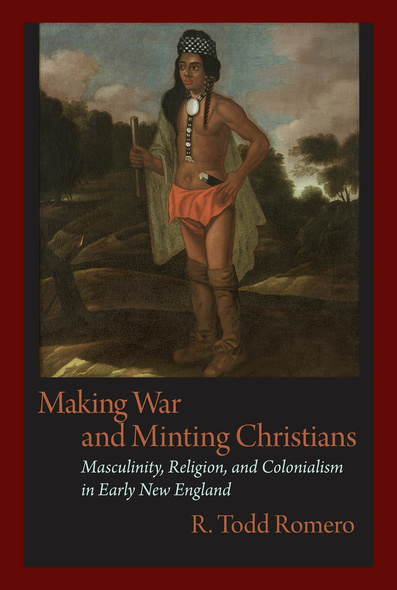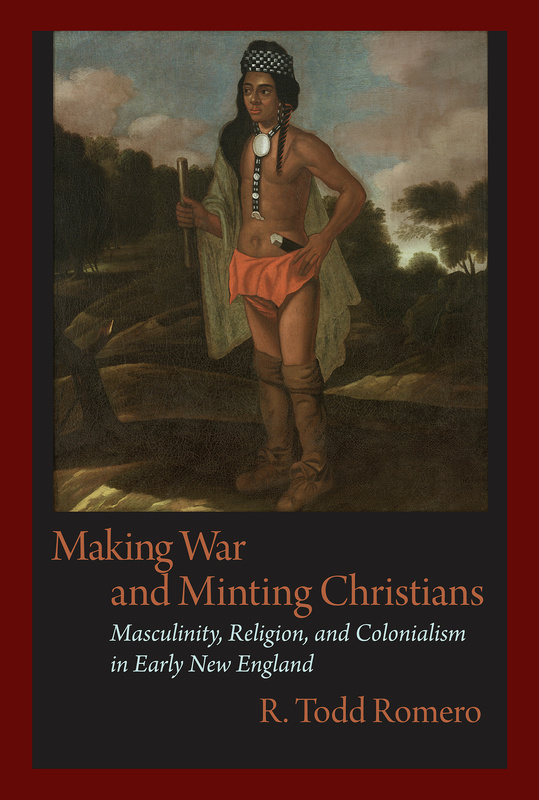
272 pages, 6 x 9
8 color illus., 3 b&w illus. (in reprints, all 11 are b&w)
Paperback
Release Date:22 Apr 2011
ISBN:9781558498884
Making War and Minting Christians
Masculinity, Religion, and Colonialism in Early New England
By R. Romero and R. Todd Romero
University of Massachusetts Press
In this book, R. Todd Romero traces the interaction of notions of gender, the practice of religion, and the conduct of warfare in colonial America. He shows how Native and Anglo-American ideas of manhood developed in counterpoint, in the context of Christian evangelization, colonial expansion, and recurrent armed conflict.
For the English, the cultivation of manliness became an important aspect of missionary efforts. Conversion demanded that the English "make men" of the Indians before they could "make them Christians," a process that involved reshaping Native masculinity according to English patriarchal ideals that the colonists themselves rarely matched. For their part, Native Americans held on to older ways of understanding the divine and defining gender even as they entered English "praying towns" and negotiated the steep demands of the missionaries.
Evolving ideas of masculinity resonated with religious significance and shaped the meaning of warfare for Natives and colonists alike. Just as the English believed that their territorial expansion was divinely sanctioned, Indians attributed a string of victories in King Philip's War to "the Great God" and the perception that their enemies "were like women." Trusting that war and manliness were necessarily linked, both groups engaged in ritual preparations for battle, believed deeply in the efficacy of the supernatural to affect the outcome of combat, and comprehended the meaning of war in distinctly religious ways.
For the English, the cultivation of manliness became an important aspect of missionary efforts. Conversion demanded that the English "make men" of the Indians before they could "make them Christians," a process that involved reshaping Native masculinity according to English patriarchal ideals that the colonists themselves rarely matched. For their part, Native Americans held on to older ways of understanding the divine and defining gender even as they entered English "praying towns" and negotiated the steep demands of the missionaries.
Evolving ideas of masculinity resonated with religious significance and shaped the meaning of warfare for Natives and colonists alike. Just as the English believed that their territorial expansion was divinely sanctioned, Indians attributed a string of victories in King Philip's War to "the Great God" and the perception that their enemies "were like women." Trusting that war and manliness were necessarily linked, both groups engaged in ritual preparations for battle, believed deeply in the efficacy of the supernatural to affect the outcome of combat, and comprehended the meaning of war in distinctly religious ways.
For several years, scholars have been calling for a book-length history of Indian gender in colonial New England, and R. Todd Romero has finally produced it. Making War and Minting Christians will not only appeal to professional scholars, but might very well appear on syllabi for undergraduate and graduate courses in colonial, American Indian, and American gender history.'—David J. Silverman, author of Red Brethren: The Brothertown and Stockbridge Indians and the Problem of Race in Early America
'Making War and Minting Christians combines a history of gender, religion and warfare in early colonial America, showing how Native and Anglo ideas of manhood developed in the context of Christian evangelization and colonial expansion and providing college-level American history readers with a survey of Native and Anglo interactions and concepts of masculinity and spirituality. These concepts shaped the nature of warfare on both sides, and are key to understanding the evolution of relations between the two groups.'—Midwest Book Review
'This relatively brief monograph reminds us that the study of gender and colonialism--particularly within the context of masculinity--offers new ways to understand Indian-European encounters. The author's emphasis on religion deserves praise, in part because the spiritual understandings of Native Americans during the colonial era remain obscure. Scholars of native religious cultures must be attuned to the methodological limitations that range from the unwillingness of native peoples to fully reveal the ceremonial and the sacred to the extent to which Indians embraced Christianity. Fortunately, Romero's sensitivity to such issues contributes to the overall success of Making War and Minting Christians.'—Journal of American History
'Drawing from a seemingly exhaustive and close reading of English print sources, a number of material objects, and a variety of Indian oral traditions, Romero argues that 'Native and Anglo-American conceptions of masculinity unfolded in counterpoint over the course of the seventeenth century and were central to the development of colonialism' (p. 7). To make his case, Romero Draws from an impressive number of episodes and exchanges that illustrate the various colonial and Native approaches to the issues at hand. . . . As a whole, this book is a nuanced and lively rereading of a time period that can often feel well traveled. As Romero convincingly shows, gendered language appeared everywhere, from the opening moments of English colonization of New England through King Philip's War and even beyond.'—The Catholic Historical Review
'Romero is at his best when detailing specific instances of how . . . constructions of masculinity functioned.'—The New England Quarterly
'This is a very rich book with much that will appeal to scholars of Native Americans, gender, and colonial American history. Romero is to be complimented for so intricately weaving together gender religion, and warfare, and effectively showing thier mutual dependence.'—American Historical Review
'As a study of gender and colonialism in Anglo-Indian relations in seventeenth-century southern New England, Making War and Minting Christians is a must read for any student of early American history'—The Historian
'This is a brief, readable, well-organized book, which would be accessible to undergraduate students, as well as to readers interested in the topic of masculinity in early Protestant colonialism.'—Taylor & Francis
'Straightforward, [Making War and Minting Christians] is an important and welcome contribution to our understanding of the Indian-Anglo-American encounter in early New England.'—Church History
R. Todd Romero is assistant professor of history at the University of Houston.




